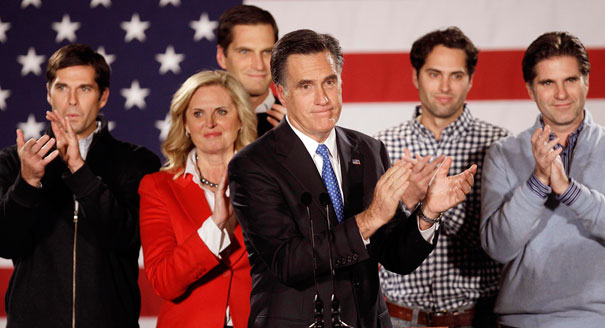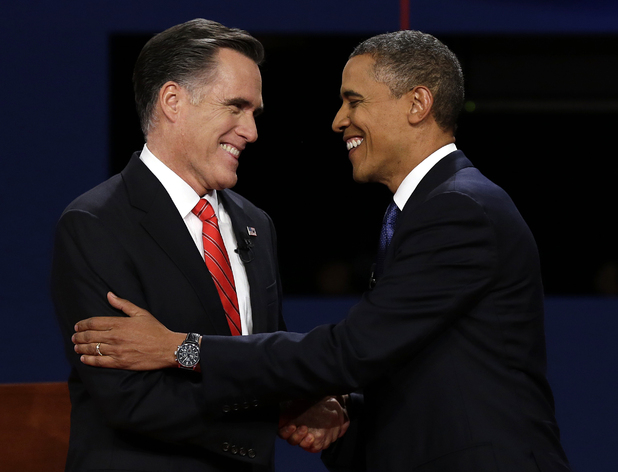Pardon the expression, but filmmaker Greg Whiteley is like a fly on the wall. He`s been given full and unfettered access to Mitt Romney, the Republican party presidential hopeful, and he makes the best of the opportunity. Over a six-year period, Whiteley follows Romney virtually everywhere and shares private moments with him. He’s the consummate observer, recording reams of personal and political events.
Whiteley`s Netflix documentary, Mitt, draws a fairly intimate, informative and never less than interesting portrait of an American politician who reached for the top and fell short.
The film opens on election night in 2012 as Romney aides tally incoming votes, flashes back to a Romney winter holiday in 2006, moves forward to the 2008 Republican primaries and concludes with Romney`s defeat at the hands of his incumbent Democratic opponent, President Barack Obama.

Romney, the former governor of Massachusetts, is portrayed as a decent, earnest, cool, pragmatic, level-headed man committed to his Mormon beliefs, dedicated to his ideas and ideals and devoted to his wife, sons, daughter-in-laws and grandchildren.
In one of the first scenes, Romney and his loved ones are seated near a blazing fireplace, discussing politics and his chances of becoming the Republican standard-bearer. “You have a duty to your country, and god, to see what comes of it,” says his eldest son, urging him to run.
But at this point, Romney is still much of an unknown. “Romney, never heard of him,” says a hotel clerk in Charleston, South Carolina, probably speaking for a lot of Americans.
Fast forwarding to the 2008 primaries, Mitt focuses on Romney’s efforts to gain name recognition from voters and acceptance from Republican power brokers. “What better guy is there than my dad,” opines one his sons and admirers. “A guy for the moment.”
As he embarks on the quest to build a “brand name,” Ann, his wife and greatest supporter and cheer leader, kneels and prays. “Our desires in doing this are pure,” she says in a reference to Romney’s ambitions. Touched by Ann’s words, he hugs her.
As the film proceeds, Romney fends off charges that he’s a flip-flopper on key issues. He defends himself, but in an unguarded moment, he admits he may be a “flawed candidate.”
John McCain, the senator from Arizona, wins the Republican nomination, but Romney accepts his victory with equanimity. “He ran a smart campaign,” he states. “He beat us.”
Whiteley doesn’t waste time on the 2012 Republican primaries. Romney, having defeated a gaggle of candidates, becomes his party’s nominee. On the eve of his first televised debate with Obama, Romney is nervous and acknowledges he’s intimidated by Obama’s oratorical skills. Nonetheless, he’s determined to “stand up to him.”

A brief clip of that debate reminds viewers that Obama, perhaps too cocky for his own good, did not perform particularly well, prompting pundits to pronounce Romney the winner. Certainly, Romney and his sons are pleased with his performance.
Yet, as Whiteley suggests, Romney is hardly arrogant or full of himself. Romney claims that his late father George — an automobile company president, governor of Michigan, U.S. cabinet secretary and wannabe U.S. president — was the “real deal” because he prospered without the benefits of material advantages in childhood or a university education.
With the second presidential debate drawing near, Ann, his constant helpmate, expresses confidence that her husband will triumph in the forthcoming election. As she puts it, “I’m very confident Mitt will win.”
Romney doesn’t fare as well in the second debate, during which Obama recovers his poise. On his last campaign stop, Romney’s vice-presidential candidate, Paul Ryan, joins him for a rally.
On election day, the Romneys wait anxiously for the results, soon realizing that Obama has pulled way ahead. “Our only hope is Ohio,” says Romney. When an aide asks what he will say in his concession speech, we know that the game is up. As the final results pour in, Ann looks pale and downcast.
Romney has already internalized the outcome. “My time on the stage is over,” he says objectively. Taking her cue from him, Ann says, “We’re done.”
Mitt ends on an elegant and somber note as he and Ann bid good-bye to staff and return to their home. Buzzing around like a fly on the loose, Whiteley takes it all in, producing a valuable cinematic account of one man’s race for affirmation, legitimacy, fame, glory and posterity.